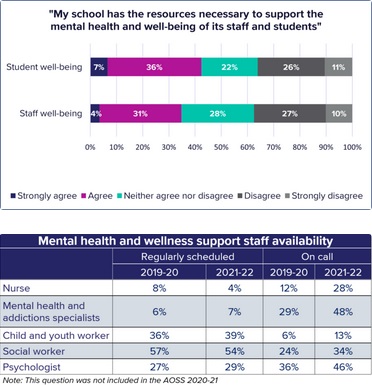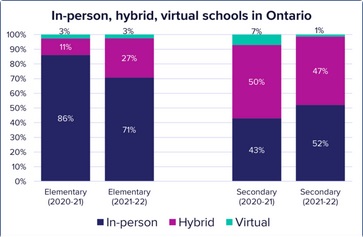New findings from People for Education's Annual Ontario School Survey (AOSS) released on Monday (March 21), show there has been little or no respite for educators in the second year of the pandemic. The issues that principals identified in their responses to the 2021 AOSS remain unchanged, and the magnitude and urgency of those issues has only grown.
The findings - based on responses from 965 publicly funded Ontario schools - reveal issues with staffing, providing mental health supports to students and staff, and ongoing challenges with the hybrid learning model.
A "fail to fill" staffing situation for Ontario's publicly funded schools
"The staffing shortages have been chronic all fall long: this is definitely an area that I would describe as a crisis." - Elementary principal, Eastern Ontario
In their responses, 90% of principals named staffing shortages as their top challenge. They reported issues coordinating staffing, filling absences, and they pointed to safety concerns caused by fewer staff.
While the province provided some COVID-related funding for additional staff in 2021-22, it was less than in the first year of the pandemic where federal funding also provided support. Staffing shortages were the result of a combination of insufficient funding, staff illness, and a limited overall supply of educators due to cuts to admissions in teaching faculties and the doubling of teacher education programs to two years.
Principals pushed to their limits
"These past two years have by far been the most difficult leading and managing in a pandemic. I know there are no easy answers or solutions, but administrator burnout is real and it's something that needs to be addressed." - Elementary principal, GTA
In this year's survey, only 29% of principals agreed that their levels of stress at work felt manageable - a decline from 35% last year. In their comments, principals pointed to the lack of supports provided to them during this pandemic on all fronts administrative, funding, safety resources, communication from the government and how this has taken a toll on their well-being and the capacity to do their jobs.
Insufficient supports for student and staff mental health
Only 43% of surveyed principals agreed with the statement "My school has the resources necessary to support the mental health and well-being of its students." The response was even lower when asked the same question about support for staff mental health and well-being with only 35% of principals agreeing necessary supports were available for staff.

While on-call access to mental health and wellness workers on call was higher this year than last year, most principals reported these specialists were available online. In their comments, principals said that accessing mental health and wellness supports virtually was less than optimal, in particular for families experiencing multiple barriers such as poverty, language, and lack of access to technology.
"The biggest challenge is that most of our usual supports have moved to virtual services. This type of model does NOT work for our students and families. Many families experience multiple systemic barriers (e.g., poverty, non-English speaking, health issues, lack of access to tech, etc.)." - Elementary school principal, GTA
Hybrid learning challenges
The proportion of elementary principals reporting they are responsible for hybrid schools has doubled since last year. In secondary school, the proportion remains fairly steady, with approximately half of principals reporting that their teachers are teaching classes where some students are present in person, and some joining remotely.
The hybrid model was introduced in Ontario to provide some flexibility, and as a method to address the fact that it is mandatory for all boards to provide an option for remote learning for all students. However, most principals responding to the AOSS, said that the model was unworkable. One called it "the most difficult task assigned to teachers to date" while another said it was "like teaching swimming and rock climbing in the same class."

Ongoing communication and implementation issues
"Having to figure out what is happening, and next steps based on what CP24 and other news outlets share with us is not a great way to lead." - Elementary principal, GTA
In last year's survey, principals repeatedly pointed to the need for more effective communication from the Ministry of Education, greater collaboration, and more lead time to adjust to changes. One year later, no progress appears to have been made on this front.
Learning from the pandemic
"The impact of the pandemic on students and staff will not end as COVID numbers decline, and the issues raised by principals will not magically disappear in the coming year. It is vital that we listen to these professionals who are telling us that they are dedicated to their jobs but that they and their staff are also hamstrung by problematic policy and a lack of sufficient support. Like all our education partners, People for Education continues to call on the government to convene an Education Advisory Task Force to ensure the province has a comprehensive plan for the coming years. - Annie Kidder, Executive Director, People for Education
The findings from the 2021-22 AOSS report make it clear that little progress has been made to alleviate staffing, mental health, and online learning issues. The report includes a reminder that in last year's AOSS, principals provided four overall recommendations for change, including more effective consultation and communication, additional funding for staff, and increased access to technology. According to the report, if anything, these recommendations are even more urgent this year.










